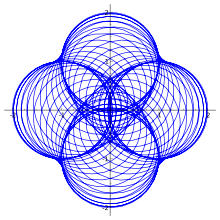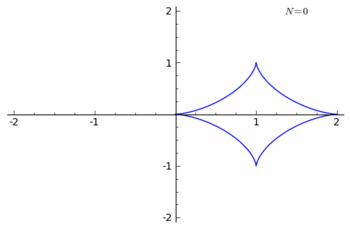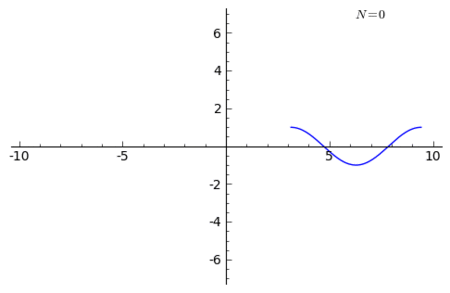- N-curve
-
We take the functional theoretic algebra C[0, 1] of curves. For each loop γ at 1, and each positive integer n, we define a curve γn called n-curve. The n-curves are interesting in two ways.
- Their f-products, sums and differences give rise to many beautiful curves.
- Using the n-curves, we can define a transformation of curves, called n-curving.
Multiplicative inverse of a curve
A curve γ in the functional theoretic algebra C[0, 1], is invertible, i.e.
exists if
If γ * = (γ(0) + γ(1))e − γ, where
![e(t)=1, \forall t \in [0, 1]](a/86a82edc137ee328f41b964bfa59242f.png) , then
, thenThe set G of invertible curves is a non-commutative group under multiplication. Also the set H of loops at 1 is an Abelian subgroup of G. If
 , then the mapping
, then the mapping  is an inner automorphism of the group G.
is an inner automorphism of the group G.We use these concepts to define n-curves and n-curving.
n-Curves and their products
If x is a real number and [x] denotes the greatest integer not greater than x, then
![x-[x] \in [0, 1].](7/a87c3839743ff3e104ecadfcb8ff7d67.png)
If
 and n is a positive integer, then define a curve γn by
and n is a positive integer, then define a curve γn byγn is also a loop at 1 and we call it an n-curve. Note that every curve in H is a 1-curve.
Suppose
 Then, since
Then, since  .
.Example 1: Product of the astroid with the n-curve of the unit circle
Let us take u, the unit circle centered at the origin and α, the astroid. The n-curve of “u” is given by,
and the astroid is
The parametric equations of their product
 are
are- x = cos 3(2πt) + cos(2πnt) − 1,
- y = sin 3(2πt) + sin(2πnt)
See the figure.
Since both α and un are loops at 1, so is the product.
Example 2: Product of the unit circle and its n-curve
The unit circle is
and its n-curve is
The parametric equations of their product
are
- x = cos(2πnt) + cos(2πt) − 1,
- y = sin(2πnt) + sin(2πt)
See the figure.

Example 3: n-Curve of the Rhodonea minus the Rhodonea curve
Let us take the Rhodonea Curve
- r = cos(3θ)
If ρ denotes the curve,
The parametric equations of ρn − ρ are
- x = cos(6πnt)cos(2πnt) − cos(6πt)cos(2πt),



n-Curving
If
 , then, as mentioned above, the n-curve
, then, as mentioned above, the n-curve  . Therefore the mapping
. Therefore the mapping  is an inner automorphism of the group G. We extend this map to the whole of C[0, 1], denote it by
is an inner automorphism of the group G. We extend this map to the whole of C[0, 1], denote it by  and call it n-curving with γ. It can be verified that
and call it n-curving with γ. It can be verified thatThis new curve has the same initial and end points as α.
Example 1 of n-curving
Let ρ denote the Rhodonea curve r = cos(2θ), which is a loop at 1. Its parametric equations are
- x = cos(4πt)cos(2πt),

With the loop ρ we shall n-curve the cosine curve
The curve
 has the parametric equations
has the parametric equations
See the figure.It is a curve that starts at the point (0, 1) and ends at (2π, 1).
Example 2 of n-curving
Let χ denote the Cosine Curve
With another Rhodonea Curve
- ρ = cos(3θ)
we shall n-curve the cosine curve.
The rhodonea curve can also be given as
The curve
 has the parametric equations
has the parametric equations- x = 2πt + 2π[cos(6πnt)cos(2πnt) − 1],

See the figure for n = 15.

Generalized n-Curving
In the FTA C[0, 1] of curves, instead of e we shall take an arbitrary curve β, a loop at 1. This is justified since
- L1(β) = L2(β) = 1
Then, for a curve γ in C[0, 1],- γ * = (γ(0) + γ(1))β − γ
and
If
 , the mapping
, the mappinggiven by
is the n-curving.
We get the formula
Thus given any two loops α and β at 1, we get a transformation of curve
- γ given by the above formula.
This we shall call generalized n-curving.
Example 1
Let us take α and β as the unit circle ``u.’’ and γ as the cosine curve
Note that γ(1) − γ(0) = 4π
For the transformed curve for n = 40, see the figure.
The transformed curve
 has the parametric equations
has the parametric equations

Example 2
Denote the curve called Crooked Egg by η whose polar equation is
- r = cos 3θ + sin 3θ
Its parametric equations are
- x = cos(2πt)(cos 32πt + sin 32πt),
- y = sin(2πt)(cos 32πt + sin 32πt)
Let us take α = η and β = u,
where u is the unit circle.
The n-curved Archimedean spiral has the parametric equations
- x = 2πtcos(2πt) + 2π[(cos 32πnt + sin 32πnt)cos(2πnt) − cos(2πt)],
- y = 2πtsin(2πt) + 2π[(cos 32πnt) + sin 32πnt)sin(2πnt) − sin(2πt)]
See the figures, the Crooked Egg and the transformed Spiral for n = 20.


See also
References
- Sebastian Vattamattam, "Transforming Curves by n-Curving", in Bulletin of Kerala Mathematics Association, Vol. 5, No. 1, December 2008
Categories:- Curves
Wikimedia Foundation. 2010.




![\gamma_n (t)=\gamma(nt - [nt]). \,](0/5105c2c7e69deae781bc4584e02cc509.png)






![\rho(t) = \cos(6\pi t)[\cos(2\pi t) + i\sin(2\pi t)], 0 \leq t \leq 1](1/8f1c4171eb06099fcb7c13d5ab60eceb.png)
e. \](6/6167f87b079bf0e3329c1a3590703ef5.png)

![x=2\pi[t-1+\cos(4\pi nt)\cos(2\pi nt)], \quad y=\cos(2\pi t)+ 2\pi \cos(4\pi nt)\sin(2\pi nt)](9/7f9104449e0527d626e55f15ca02ac8d.png)




.](2/d0271bb8aafff4407170802634c55322.png)
